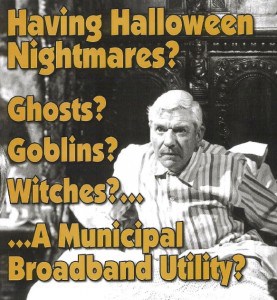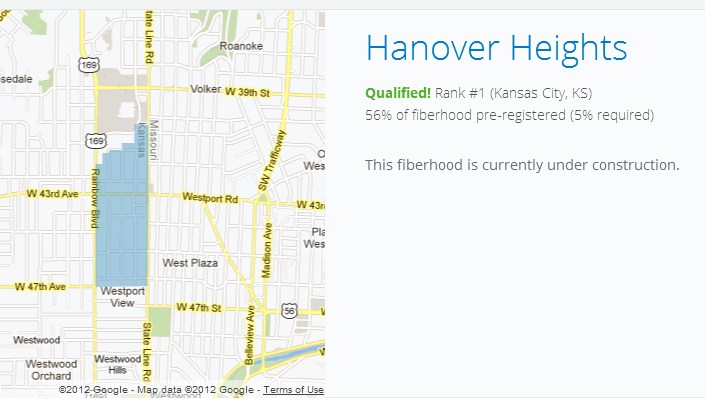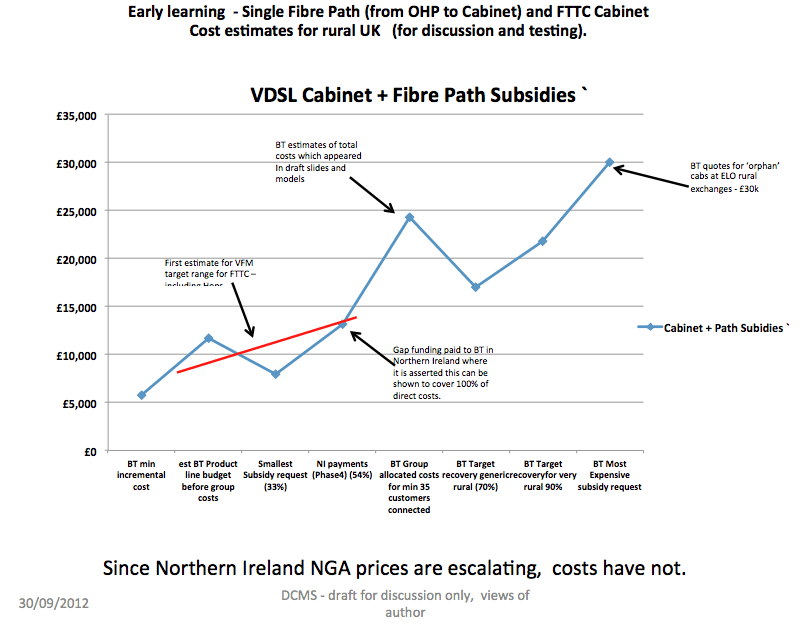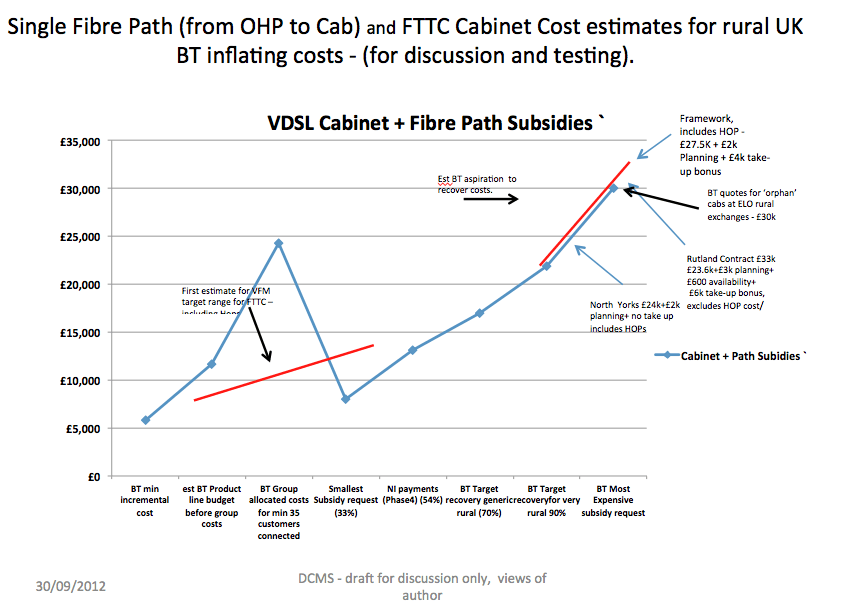It is amazing the length some incumbent broadband providers will go to stop publicly-owned networks from getting off the ground and competing with the “good enough for you” service on offer from the local phone or cable company.
This morning, Stop the Cap! received word from a Minnesota reader who reports their dinner hour was interrupted by an unsolicited phone call from a group called “Americans for Sensible Broadband,” which as far as we can tell does not exist as a formal group. The caller used ridiculous scare tactics worthy of a bad Halloween movie:
- Did you know that fiber broadband networks are expensive to run and will increase your electric bill to pay for the high powered lasers needed to send the signal to your home?
Fiber broadband projects now expanding in Minnesota have no relation to your electric bill because most are run by independent community-owned co-ops, not electric utilities. Even if they were run by an electric provider, the cost to power a fiber network is far smaller than the network of signal amplifiers and other transmission equipment needed by traditional cable and phone companies. The only electrical expense to the homeowner is powering any set top boxes or other related equipment to make use of the service. These costs are comparable to what one would pay with cable or phone services.
- Most fiber networks are not actually fiber at all. The largest companies in America actually let you keep your current wiring, but that is not fiber, so why spend tax money on a risky fiber network?
While AT&T U-verse has chosen the route of “fiber to the neighborhood,” which still relies on existing copper wiring from nearby poles to your home, many fiber to the home projects take fiber… straight to the home. Some community networks do make use of very short lengths of pre-existing copper wiring inside your home, but this has more to do with your convenience. You don’t need a fiber connection to your landline phone, for instance. Compare the broadband speeds and services on offer from the community provider vs. incumbent cable and phone companies. Choose the one that delivers the best services for the price.
- America’s cable and phone companies are working hard for pro-growth, pro-expansion policies in Washington that will allow your community to get the benefit of billions of private investment, at no risk to you.
Incumbent phone and cable companies already enjoy a higher level of deregulation than ever before. If they have not spent money to improve broadband in your area before, there is nothing that will open their wallets to provide the service now, unless someone else subsidizes part of the cost. Guess who “someone” is? That’s right. You the taxpayer or ratepayer. Whether in the form of broadband subsidies paid for by taxpayer dollars or ratepayer subsidies from the Universal Service Fund, only subsidies or competition prod incumbents to deliver better broadband to rural Minnesota (or anywhere else). If you fail a “Return On Investment” test, you will not get broadband no matter how much deregulation gets approved in Washington.
The question for rural consumers is whether AT&T, Frontier, CenturyLink, Comcast, or Charter Cable has your best interests at heart or whether a community co-op you partly own will.
- In socialistic countries, the government runs the broadband service and can monitor your web browsing. Do you want your local community checking up on your online activities?
“Socialistic” is in the eye of the beholder. Most broadband networks are run by private telecommunications companies, some with state subsidies, others entirely on their own. The federal government’s security agencies already have access to monitor Internet traffic under warrantless wiretapping laws, and that extends to every provider in the country, private or public. That said, there is no evidence local government officials would monitor your web browsing habits, much less have the budget or technical expertise to do so.
- Fiber cables create more hazards on utility poles designed for phone, cable and electric service. Is it worth risking those services for an unnecessary and expensive fiber network?
Electric and phone companies used the same scare stories to try and keep cable television lines off utility poles more than 30 years ago. Cable operators fought for and won the right to use utility poles to no ill effect, and at fair prices. It is ironic some cable companies want to use the same argument against municipal fiber that phone and electric companies used against them.
- In these difficult economic times, do you realize your local taxes could triple to pay for unnecessary fiber Internet?
Most public broadband projects are financed by municipal bonds obtained in the private free market. Investors can decide for themselves if they represent a safe investment, and many do. If the networks fail, private investors typically take the hit.
But the most ridiculous claim of all was that “recent news reports warn that lasers could blind your children if they happen to play with the fiber cables in your home.”
The only “news report” we could find on this subject was an Engadget news story from 2011 about an S3 Krypton laser that could blind astronauts without proper safety equipment. But those lasers are not powering broadband networks.
In reality, fiber to the home networks are safer than traditional copper phone wiring, which can send a significant electric shock to anyone playing with the wiring when a telephone rings. Many fiber networks rely on Class 1, low power lasers — the lowest risk level. Even if a customer stared at the lit end of an optical fiber connector, the visible light would be diffused into a cone pattern that would be completely harmless by the time it reached the retina. Many networks also include a secondary safety mechanism that quickly shuts down the laser light once the connection has been broken. Certain higher-powered laser communications networks can have some safety risks, but almost entirely for workers working on primary cables that deliver service to dozens of homes. Those workers are well-trained to avoid those risks.
Minnesota seems to be one of the latest hotbeds of incumbent wrath over expanding community-owned broadband networks. Despite efforts to label them insidious creeping socialism, they are actually no more threatening than a traditional co-op, except perhaps to incumbent cable and phone companies that have been running to the bank cashing checks from customers enduring low broadband speeds at high prices.


 Subscribe
Subscribe











